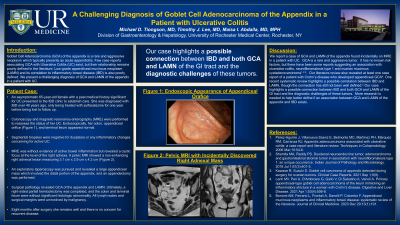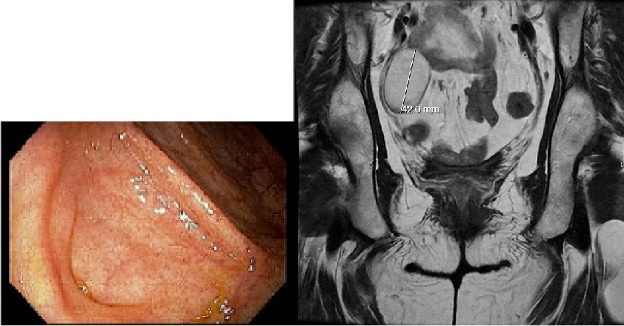Tuesday Poster Session
Category: IBD
P4442 - A Challenging Diagnosis of Goblet Cell Adenocarcinoma of the Appendix in a Patient With Ulcerative Colitis
Tuesday, October 29, 2024
10:30 AM - 4:00 PM ET
Location: Exhibit Hall E

Has Audio

Michael D. Tiongson, MD
University of Rochester Medical Center
Rochester, NY
Presenting Author(s)
Award: Presidential Poster Award
Michael D. Tiongson, MD, Timothy J. Lee, MD, Maisa Abdalla, MD, MPH
University of Rochester Medical Center, Rochester, NY
Introduction: Goblet Cell Adenocarcinoma (GCA) of the appendix is a rare and aggressive neoplasm which typically presents as acute appendicitis. Few case reports associating GCA with Ulcerative Colitis (UC) exist, but their relationship remains poorly defined in the literature. We present a challenging diagnosis of GCA of the appendix in a patient with UC.
Case Description/Methods: An asymptomatic 65-year-old female with a past medical history significant for UC presented to the Inflammatory Bowel Disease (IBD) clinic to establish care. She had been diagnosed over 40 years prior after undergoing a proctosigmoidoscopy which revealed colitis. She was treated with sulfasalazine for one year and was subsequently lost to follow up.
Colonoscopy and magnetic resonance enterography (MRE) were performed to reassess the status of her UC. Endoscopically, her colon, appendiceal orifice, and terminal ileum appeared normal (Image 1). Segmental biopsies were negative for dysplasia or any inflammatory changes concerning for active UC. MRE was without evidence of active bowel inflammation but revealed a cystic focus at the level of the right adnexa.
A pelvic MRI showed a non-enhancing right adnexal lesion measuring 3.1 cm x 2.9 cm x 4.2 cm (Image 1). An exploratory laparoscopy was pursued and revealed a large appendiceal mass. The mass was involving the distal portion of the appendix and an appendectomy was performed. Surgical pathology revealed GCA of the appendix and low-grade appendiceal mucinous neoplasm. Ultimately, a right-sided partial hemicolectomy was completed, and the colon and terminal ileum were without significant histologic abnormality. All lymph nodes and surgical margins were uninvolved by malignancy. Eight months after surgery she remains well and there is no concern for recurrent disease.
Discussion: We report a case of GCA of the appendix found incidentally on MRE in a patient with UC. GCA is a rare and aggressive tumor. It has no known risk factors, but there have been some reports suggesting an association with ulcerative colitis, neurofibromatosis type 1 and ovarian mucinous cystadenocarcinoma. Our literature review also revealed at least one case report of a patient with Crohn’s disease who developed appendiceal GCA. Our case highlights a possible connection between IBD and GCA of the GI tract and the diagnostic challenges of this tumor. More research is needed to help better define if an association between GCA of the appendix and UC exists.

Disclosures:
Michael D. Tiongson, MD, Timothy J. Lee, MD, Maisa Abdalla, MD, MPH. P4442 - A Challenging Diagnosis of Goblet Cell Adenocarcinoma of the Appendix in a Patient With Ulcerative Colitis, ACG 2024 Annual Scientific Meeting Abstracts. Philadelphia, PA: American College of Gastroenterology.
Michael D. Tiongson, MD, Timothy J. Lee, MD, Maisa Abdalla, MD, MPH
University of Rochester Medical Center, Rochester, NY
Introduction: Goblet Cell Adenocarcinoma (GCA) of the appendix is a rare and aggressive neoplasm which typically presents as acute appendicitis. Few case reports associating GCA with Ulcerative Colitis (UC) exist, but their relationship remains poorly defined in the literature. We present a challenging diagnosis of GCA of the appendix in a patient with UC.
Case Description/Methods: An asymptomatic 65-year-old female with a past medical history significant for UC presented to the Inflammatory Bowel Disease (IBD) clinic to establish care. She had been diagnosed over 40 years prior after undergoing a proctosigmoidoscopy which revealed colitis. She was treated with sulfasalazine for one year and was subsequently lost to follow up.
Colonoscopy and magnetic resonance enterography (MRE) were performed to reassess the status of her UC. Endoscopically, her colon, appendiceal orifice, and terminal ileum appeared normal (Image 1). Segmental biopsies were negative for dysplasia or any inflammatory changes concerning for active UC. MRE was without evidence of active bowel inflammation but revealed a cystic focus at the level of the right adnexa.
A pelvic MRI showed a non-enhancing right adnexal lesion measuring 3.1 cm x 2.9 cm x 4.2 cm (Image 1). An exploratory laparoscopy was pursued and revealed a large appendiceal mass. The mass was involving the distal portion of the appendix and an appendectomy was performed. Surgical pathology revealed GCA of the appendix and low-grade appendiceal mucinous neoplasm. Ultimately, a right-sided partial hemicolectomy was completed, and the colon and terminal ileum were without significant histologic abnormality. All lymph nodes and surgical margins were uninvolved by malignancy. Eight months after surgery she remains well and there is no concern for recurrent disease.
Discussion: We report a case of GCA of the appendix found incidentally on MRE in a patient with UC. GCA is a rare and aggressive tumor. It has no known risk factors, but there have been some reports suggesting an association with ulcerative colitis, neurofibromatosis type 1 and ovarian mucinous cystadenocarcinoma. Our literature review also revealed at least one case report of a patient with Crohn’s disease who developed appendiceal GCA. Our case highlights a possible connection between IBD and GCA of the GI tract and the diagnostic challenges of this tumor. More research is needed to help better define if an association between GCA of the appendix and UC exists.

Figure: Image 1. Endoscopic appearance of the appendiceal orifice and associated appendiceal mass on pelvic MRI
Disclosures:
Michael Tiongson indicated no relevant financial relationships.
Timothy Lee indicated no relevant financial relationships.
Maisa Abdalla indicated no relevant financial relationships.
Michael D. Tiongson, MD, Timothy J. Lee, MD, Maisa Abdalla, MD, MPH. P4442 - A Challenging Diagnosis of Goblet Cell Adenocarcinoma of the Appendix in a Patient With Ulcerative Colitis, ACG 2024 Annual Scientific Meeting Abstracts. Philadelphia, PA: American College of Gastroenterology.

